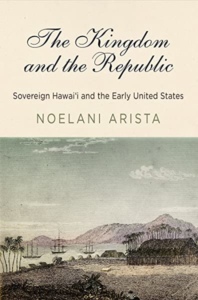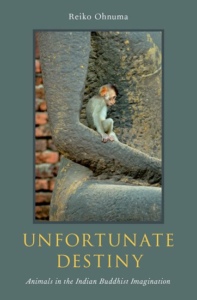Book Spotlights: The Kingdom and the Republic
The Kingdom and the Republic: Sovereign Hawai’i and the Early United States
By Noelani Arista CEF ’13

The early 1800s saw immense change for the islands of Hawai’i. The first American missionaries landed in 1823. Laws were being translated from oral tradition to written. With the sandalwood trade came new legal restrictions on access to Hawaiian women for foreigners in 1825. This law—implemented by the chiefs, called ali’i, but misinterpreted as coming from the missionaries—resulted in an attack on two mission stations and a breakdown in relations between the merchants, missionaries, and sailors.
By digging into previously unknown Hawaiian language archives, Noelani Arista creates a more robust picture of colonial Hawai’i. She explores the formations of native politics and law and how that rule extended to the changing population of both indigenous and foreign people.
Dr. Arista “upends a simplistic colonial historiography that makes American missionaries the dominant forces in the period,” wrote David Chang of the University of Minnesota. The book “reveals instead a more complex and surprising story that speaks powerfully to questions of law, culture, language, and power in history.”
The Kingdom and the Republic was the winner of the Native American and Indigenous Studies Association First Book Award for 2020.
Book Spotlight: Unfortunate Destiny
 Animals have held complicated positions in Indian Buddhism. Being reborn as an animal is considered a durgati or a most “unfortunate destiny,” begot from bad karma and lack of moral character. But, descriptions of Buddha’s past lives include wise and virtuous animals, critical of mankind’s failings. In her new book, Unfortunate Destiny: Animals in the Indian Buddhist Imagination, Reiko Ohnuma CN ’95 explores the roles played by nonhuman animals.
Animals have held complicated positions in Indian Buddhism. Being reborn as an animal is considered a durgati or a most “unfortunate destiny,” begot from bad karma and lack of moral character. But, descriptions of Buddha’s past lives include wise and virtuous animals, critical of mankind’s failings. In her new book, Unfortunate Destiny: Animals in the Indian Buddhist Imagination, Reiko Ohnuma CN ’95 explores the roles played by nonhuman animals.
Using imagery and dialogue and by considering specific animal characters, Dr. Ohnuma examines how animals serve as an important counterpoint to human activities throughout South Asian Buddhist texts. Animals and humans are connected in ways that are supportive and friendly but also cruel and abusive. But, as the book explores, these animal characters and stories always stand opposite humans in a way that distills human nature and the principals of Buddhism.
Dr. Ohnuma is a professor of religion, Asian and Middle Eastern Studies, and women’s, gender, and sexuality studies at Dartmouth College

